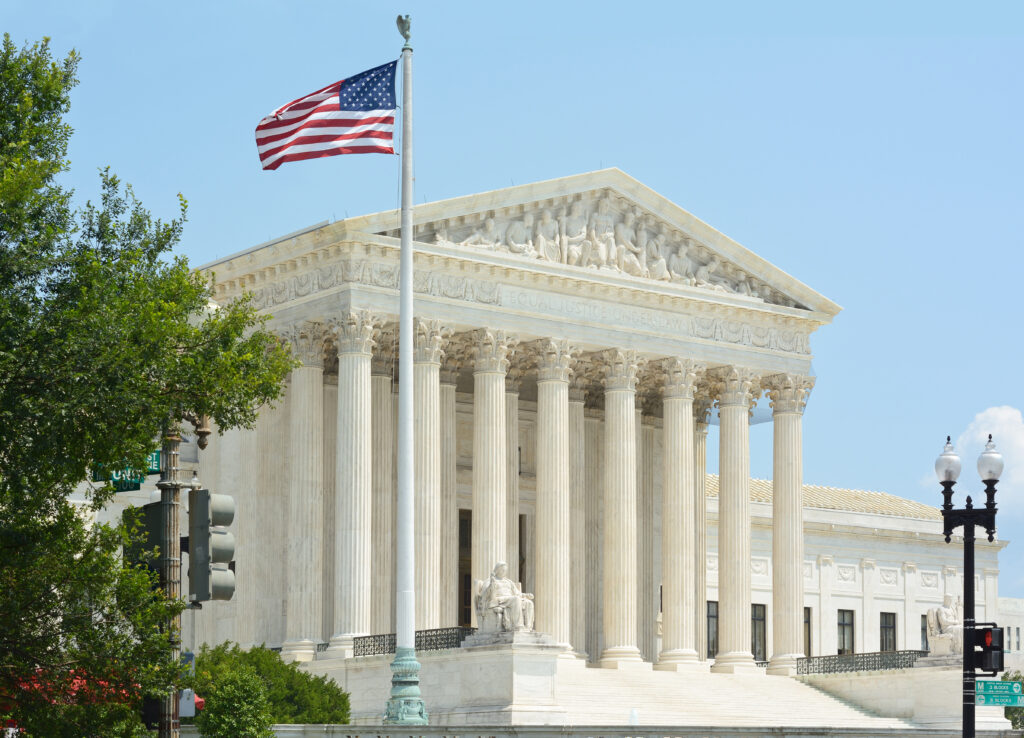Pennsylvania Orgs Ask SCOTUS To Decide if Rejecting Mail-in Ballots for Date Errors Violates Civil Rights Act

Pennsylvania organizations and voters are asking the U.S. Supreme Court to consider whether rejecting otherwise valid mail-in ballots with incorrect or missing dates on return envelopes violates a federal Civil Rights Act provision.
Over the past few years, at least 12 lawsuits in both state and federal courts have involved disputes over the battleground state’s controversial handwritten date requirement, which resulted in the disqualification of over 10,000 mail-in ballots during the 2022 midterm elections alone.
Today’s cert petition originates from a 2022 lawsuit led by the Pennsylvania State Conference of the NAACP alleging that the practice of disqualifying mail-in ballots on the basis of handwritten date errors violates the Civil Rights Act’s Materiality Provision.
The Materiality Provision specifically protects against disenfranchisement on the basis of trivial errors or omissions that are unrelated to a voter’s qualifications.
The NAACP’s suit contends that because the timeliness of mail-in ballots in Pennsylvania is determined by when county election officials receive and timestamp the ballots, “the presence or absence of a handwritten date on the envelope is utterly immaterial to determining whether the ballot was timely received, much less to assessing a voter’s qualifications.”
“In Pennsylvania, thousands of voters’ mail ballots were set aside, left unopened and uncounted, because the voter failed to include a handwritten date when completing a required form printed on the outer mail ballot return envelope, or included a date that was deemed ‘incorrect,’” the newly filed cert petition reads.
“Refusing to count a person’s vote because of immaterial mistakes on such required paper forms is unlawful.”
Post-election data demonstrate that thrown-out ballots disproportionately come from Democratic and elderly voters, who have a higher propensity to vote by mail.
In a November 2023 ruling, a federal judge agreed with the NAACP’s arguments, but the 3rd U.S. Circuit Court of Appeals later reversed the decision at the request of the Republican National Committee and other GOP committees.
According to the 3rd Circuit’s reasoning, the Materiality Provision only applies to the voter registration process — which concerns whether a person is qualified to vote — but “does not apply to rules, like the date requirement, that govern how a qualified voter must cast his ballot for it to be counted.”
This interpretation, the cert petition states, “is contrary to the statute’s plain text and ignores or misapplies settled rules of statutory construction. The statute expressly covers not just errors on voter registration forms but errors on ‘any record or paper relating to any application, registration, or other act requisite to voting.’”
Although the 3rd Circuit rejected the organizations’ Materiality Provision claim, it allowed their other claims to proceed in the district court. A decision remains pending from a federal judge as to whether disqualifying mail-in ballots for date errors contravenes the right to vote under the U.S. Constitution’s First and 14th Amendments.
Meanwhile, a new lawsuit challenging the date requirement under the Pennsylvania Constitution is currently before the state Supreme Court. Earlier this month, a Pennsylvania court blocked the strict enforcement of the date requirement for violating the state constitution’s Free and Equal Elections Clause, but the state’s highest court later vacated that decision on jurisdictional grounds.
It is unlikely that the U.S. Supreme Court will grant or deny the NAACP’s cert petition prior to the November 2024 election, but the plaintiffs’ outstanding constitutional claims as well as the pending state court litigation could very well be resolved prior to Nov. 5.
In their petition, the parties asked that the Court void the 3rd Circuit’s initial decision rejecting their Materiality Provision claim if the issue were to be “conclusively resolved” by the ongoing state court case.
Should the justices opt to take up the case, voting rights lawsuits across the country invoking the Materiality Provision could be impacted by the Court’s ultimate decision. Republican litigants in many cases have argued that the provision lacks a private right of action — meaning only the U.S. attorney general can sue to enforce it.
The 3rd, 5th and 11th U.S. Circuit Courts of Appeals have all previously rebuffed that argument, instead concluding that the provision has an “implied” private right of action. Nevertheless, the high court might take up this case as an opportunity to clarify whether private plaintiffs have the right to sue under the statute.
Democracy Docket is currently tracking nine active voting rights lawsuits that bring claims under the Materiality Provision. Most recently, a federal judge temporarily enjoined the enforcement of a new Arkansas rule requiring a pen-on-paper signature for voter registration after deeming the rule a likely violation of the provision.